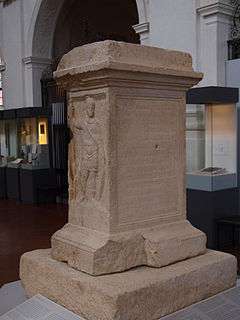Juthungi

The Juthungi (Greek: Iouthungoi, Latin: Iuthungi) were a Germanic tribe in the region north of the rivers Danube and Altmühl in the modern German state of Bavaria.
The tribe was mentioned by the Roman historians Publius Herennius Dexippus and Ammianus Marcellinus. The meaning of their name is “descendants”, and refers to the ancient Suebian tribe of the Semnoni.
The Juthungi invaded Italy in 259–260, but on their way back they were defeated near Augsburg on 24–25 April 260 by Marcus Simplicinius Genialis (this is recorded on a Roman victory altar found in 1992). At this time the Roman Empire lost control of this part of the limes. Between 356 and 358 the Juthungi and the Alamanni invaded the province of Raetia, and destroyed Castra Regina (the Roman capital of the province, and one of the biggest Roman military camps in south Germany, with massive stone walls and a village). A second invasion of Raetia in 383 was repelled by an army of Alans and Huns. Between 429 and 431 the Roman general Aëtius also fought against the Juthungi in Raetia.
Historical sources
- Augsburg Victory Altar (around 260)
- Dexippus - FGrHist 100 (around 270/271)
- Panegyrici Latini VIII 10.4 (around 297)
- Ammianus Marcellinus 17,6 (around 375)
- Sidonius Apollinaris, c. 7, 233 (around 429/430)